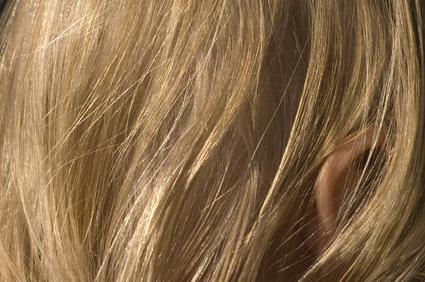Hair loss can occur as the result of trauma, genetics, medications, stress, vitamin deficiencies or thyroid problems. Although a well-balanced diet and healthy lifestyle are important for hair growth, vitamin supplements may also help your hair growth, according to WebMD. Add B-12, biotin, zinc, iron and essential fatty acids to your diet to maximize hair growth and help your hair to grow back quickly.
Significance
Adding the right vitamins and supplements to your diet can help to maximize your hair growth, by either correcting vitamin and mineral deficiencies or giving your body plenty of what it needs for scalp and hair follicle health. Keep in mind that hair loss can be a symptom of other issues, including thyroid problems and autoimmune conditions, according to WebMD. Mention unexplained or excessive hair loss to your doctor.
Function
Each of these vitamin supplements can affect hair growth in different ways, but you may see improvement in your hair loss and find that your hair grows more quickly if you incorporate them into your daily regimen, according to MotherNature.com. Once hair has grown from the scalp, the cells are dead and, although proper care can prevent dryness and breakage, vitamins and supplements can improve the health of the hair follicles and scalp.
B-Vitamins
Vitamins and minerals that may aid in hair growth include B-12 and biotin. Biotin is key to the production of hair and to good hair health. Hair production relies upon vitamin B-12, and even a slight deficiency may cause hair loss. B-12 and biotin supplements are widely available. Take 2 mg to 3 mg of biotin daily to encourage hair growth, according to WebMD. Take a 50 mcg B-12 supplement to insure adequate levels of this key vitamin, suggests Dr. Andrew Weil. B vitamins have a low toxicity and are quite safe, according to the National Institutes of Health.
Minerals
Iron and zinc can also help hair grow back or treat hair loss in women. Iron supplements can prevent anemia; however, these are only appropriate if you need them. Your health care provider can quickly and easily test for anemia and recommend an appropriate supplement. Supplement vitamin C along with iron for better absorption, according to MotherNature.com. Zinc supplementation may lower the level of androgens in the body, preventing hormone-associated hair loss, according to WebMD. Take no more than 80 mg of zinc daily.
Warning
Although some vitamins and supplements are widely recommended and appropriate for most people, others are not. Excessive iron supplementation may cause iron overload. Exceed the recommended daily allowance of 18 mg per day only under medical supervision, according to MotherNature.com. While zinc supplementation may help to reduce hair loss, according to WebMD.com, it is key that zinc and copper remain in balance in the body. If you are concerned, limit your zinc supplementation to the amount available in your daily multivitamin.
Photo Credit
- hair image by Dubravko Grakalic from Fotolia.com





